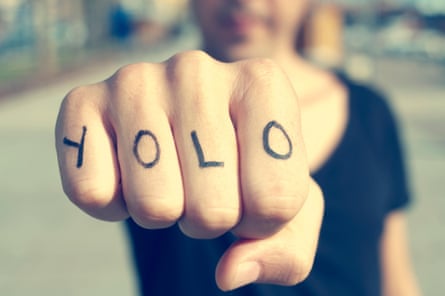Before the opening keynote of the Millennial 20/20 Sydney conference, a man strides up, folds me into a boardroom-firm handshake and gazes deeply into my eyes.
His impeccably tailored business shirt, open to the third button, and swept-back blond hair make him look like a more handsome version of the Trump sons, maybe a second cousin. But our meeting is an error; I inadvertently sat in one of the conference’s many designated networking spaces, signalling that I wish to be approached. By the time I apologise and move away, he is deep in conversation with someone else.
Millennial 20/20, held this week, was a two-day meeting of hundreds of marketing executives, CEOs, startup founders, digital salespeople, youth publishers and app developers all looking to answer one question: how to convince, coax, distract, datamine or otherwise compel young people to give their companies money. Representatives from some of the largest brands in the world gathered to swap success stories, share tips, and peacock their youth-whisperer cred in front of any potential poachers.
Junior vice-presidents from blue-chip firms such as Telstra, Microsoft and Mondelēz International rub elbows with more familiar brands such as Airbnb, Deliveroo and Pandora. New media doyens from Vice and BuzzFeed circle, chatting with swarms of emissaries from adventurously named outfits you’ve never heard of, like Zuper and Paddl. Together they comprise a large portion of what is nebulously termed the “new economy” and a not-insignificant slice of the global one, so their collective perception of my generation carries weight, whether it’s accurate or not.
After two days surrounded by that collective perception, the thought is not encouraging.
Millennial 20/20 is at Carriageworks, a vast converted former railway depot in Redfern. When home to a conference like this, the venue becomes the exposed-brick-and-beam embodiment of the bloodless one-world aesthetic the conference is here to spruik; all reappropriated industrial working-class chic and graffiti reading “HOPE”.
A ping-pong table, unloved redoubt of startup offices the world over, sits neglected to one side, the “Double Happiness” slogan adorning it neither noticed nor understood. The Economist sponsorship stand is handing out free vegetable smoothies, ostensibly to make a point about food waste. The hand soap dispenser in the bathroom bears a Mark Twain quote urging me to “Explore. Dream. Discover.”. The wifi password is “SmashedAvo”.

From the Pyramid Stage, festooned with artificial ivy vines, speakers dispense wisdom on the mystical millennial, a term that remains conveniently undefined. Devoting so much effort to understanding “young people” may have seemed too fogeyish.
The insights, such as they are, sometimes reveal more about the speakers than the young consumers that they profess to know. Facebook Australia’s marketing head tells the audience the key to a “purposeful life” is “work-life integration, rather than work-life balance”, and cites an example about the importance of diversity from Facebook COO Sheryl Sandberg, who encourages teachers to tell parents that their assertive daughter is not “bossy”, but rather has “executive leadership skills”.
But the main attraction isn’t the speakers; it’s the opportunity to network, and these people network hard. On stylised picnic tables and precarious barstools scattered throughout the hall, marketing executives in smart casual collect phone numbers and LinkedIn contacts with the fervour I once applied to amassing Pokemon cards. “The only time someone’s not trying to sell me something is in the bathroom”, an exhausted attendee says.
The presentations pass by in a blur. I lose count of the number of times someone mentions “disruption”, or extols the virtues of “starting a conversation”. The speakers are in furious agreement that millennials are a rich gold seam waiting to be tapped, needing only the right combination of effortless cool, total authenticity and microscopic data tracking to crack it open.
Given the way that many of these companies treat the young people they claim to have such deep connections with, it’s not surprising that a great deal goes unsaid. A co-founder of youth site Pedestrian.tv hosts a panel dedicated to unpacking where millennials are spending their money, but gives no insight into whether content on his website paid for by a front group for the Australian Taxpayers’ Alliance, a pro-tobacco lobby group, successfully induced more young people to take up e-cigarettes.
Representatives from the Commonwealth Bank and Westpac wax lyrical on “building a culture of innovation”, but have nothing to say about their exploitative lending practices encouraging young would-be homeowners to take out mortgages they can’t afford. Unilever is eager to showcase its work keeping Weis Bars Australian-made since buying out the Toowoomba family business in August; less so to highlight the boycott its Streets ice-cream brand is facing for cutting workers’ wages by almost half.

But it’s when the we-are-your-friends shtick gets personal that it really starts to unsettle. Michael Pearson, the managing director of travel website Expedia, wonders why “millennials are delaying those key life purchases” such as houses and weddings; he boasts that his firm’s 700 data scientists trawl their customers’ information to target them as minutely as possible. “I know where he lives, I know he has a wife and two kids,” Pearson enthuses. A representative from the Accor hotel chain speaks of a new alternative accommodation option for backpackers, the Mama Shelter, designed to replicate the feeling of “being in your mother’s arms”.
That attitude of predatory infantilisation seeps into everything here. It’s in the free donuts, branded fidget-spinners and misshapen Rubik’s cubes sponsors are giving out in exchange for contact details. It’s in the endless, slickly produced promotional videos, splashing all-caps banalities such as “LIFE IS AMAZING” and “COME AS YOU ARE” over footage of people running through meadows and the swelling of children’s choirs. It’s in IYC POP, a sponsor slinging frozen cocktails in Calippo-like sleeves which vaunts itself as “a luxury popsicle for adults” and “a true disruptor in the frozen confectionary industry”.
Most of all, it’s in how completely this congregation believes its own sermon. These people want to believe so badly that they are the harbingers of something bright and new, when they’re really just inventing more efficient ways to do what big businesses have always done: make mountains of money by screwing people over. Cutting costs by denying workers basic rights and conditions is as old as the hills, but do it via a smartphone app and you’re a paragon of innovation. It is dead-eyed capitalism with Snapchat’s puppy filter on.
I learned very little about millennials at Millennial 20/20, save that a great many people are working very hard to turn us upside down by our ankles and shake us until money comes out. Being part of a generation bent under neoliberalism’s deadening legacy, from housing affordability to climate change, is exhausting enough; to see the companies that profit off our exploitation rhapsodise about their self-appointed status as “change makers” and “thought leaders” just adds salt to the wound.



Comments (…)
Sign in or create your Guardian account to join the discussion